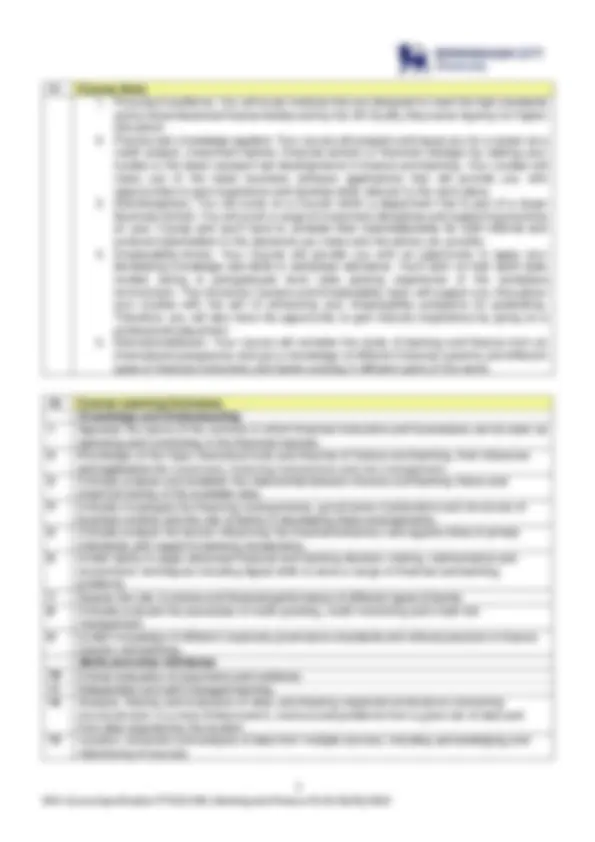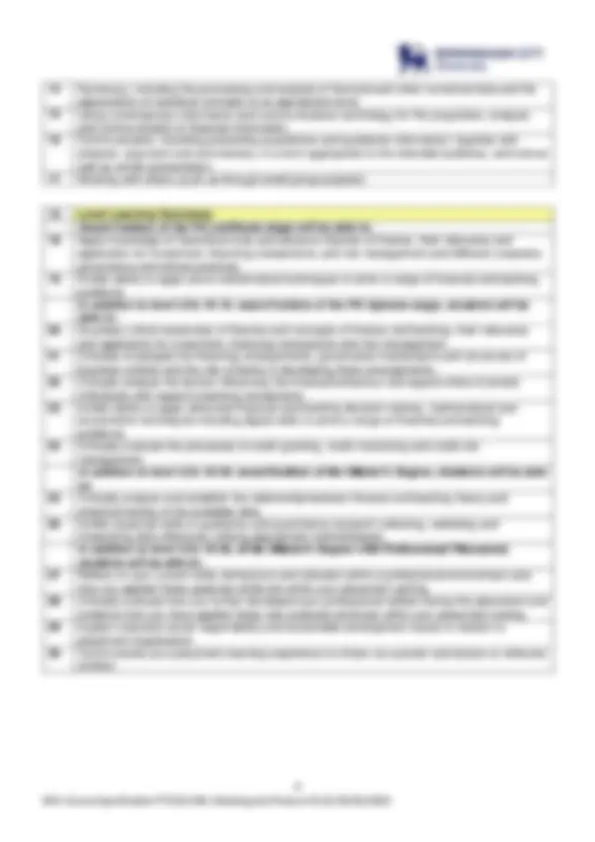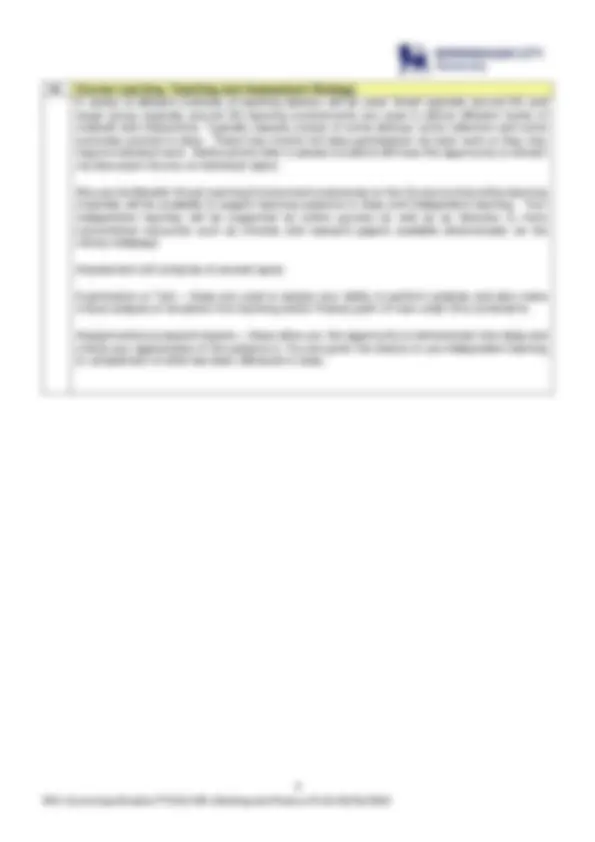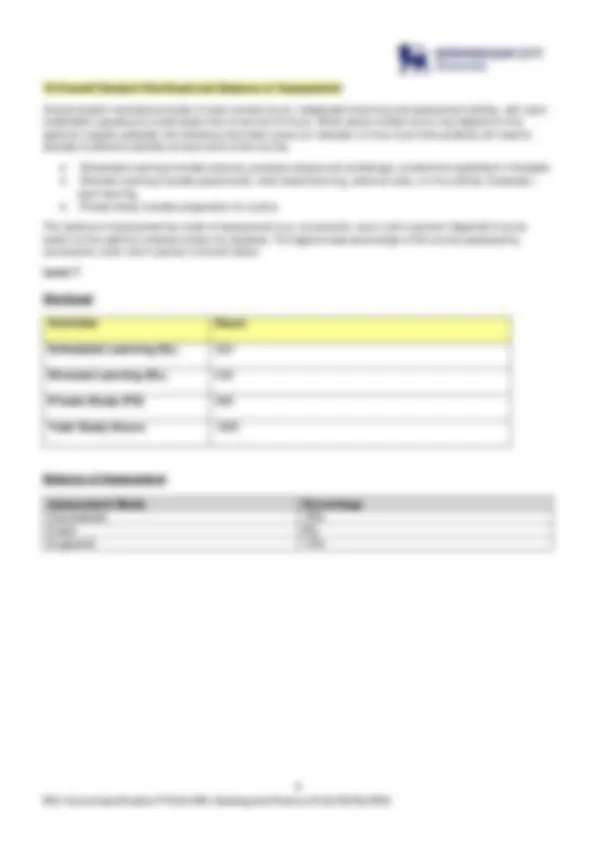






Study with the several resources on Docsity

Earn points by helping other students or get them with a premium plan


Prepare for your exams
Study with the several resources on Docsity

Earn points to download
Earn points by helping other students or get them with a premium plan
Community
Ask the community for help and clear up your study doubts
Discover the best universities in your country according to Docsity users
Free resources
Download our free guides on studying techniques, anxiety management strategies, and thesis advice from Docsity tutors
Information about the MSc Banking and Finance course offered by Birmingham City University. The course covers traditional banking skills and expanding areas of finance such as digital banking, cryptocurrencies, and initial coin offerings. Students will learn how to analyze risk, make credit decisions, manage treasury operations, and gain professional certifications from the Chartered Banker Institute. The course prepares students for roles as credit analysts, investment bankers, financial advisors, risk managers, treasury specialists, and underwriters. The program includes modules on financial institutions, financial markets, asset-liability management, banking business and operations, financial risk management, and international finance.
What you will learn
Typology: Lecture notes
1 / 8

This page cannot be seen from the preview
Don't miss anything!





Course Summary Information 1 Course Title MSc Banking and Finance 2 Course Code PT 3 Awarding Institution Birmingham City University 4 Teaching Institution(s) (if different from point 3 ) 5 Professional Statutory or Regulatory Body (PSRB) accreditation (if applicable) 6 Course Description In this course you will learn how to analyse risk and make credit decisions, how to deal with small and large businesses, and how to manage a bank’s treasury operations. In addition to traditional banking skills, the course will provide the skills for those areas of finance which have expanded significantly in recent years, such as digital banking, cryptocurrencies and initial coin offerings. Modules and assessments will include real-life case studies and exercises. Staff involved in designing this course have significant practical experience of working in the areas taught. The content of the course relates closely to that offered by the Chartered Banker Institute (CBI), thus helping students to gain the Advanced Diploma in Banking and Leadership in the Digital Age or a Professional Banker Certificate. This Master’s course prepares you for such positions as credit and loan officer, financial advisor, risk manager, treasury specialist and underwriter. You will be taught by highly-qualified academics with industrial and professional experience and actively involved in research. The MSc Banking and Finance is one of the most popular Master’s programmes in finance in the UK. The banking sector is one of the most successful and stable sectors in the UK. The banking sector has also seen strong growth in Birmingham in recent years, with some banks moving their headquarters from London to Birmingham, including HSBC. What's covered in the course? In Semester 1 (Certificate stage) you will take Financial Institutions and Regulation, Advanced Corporate Finance and Strategic Risk Management. In these modules you will receive an overview of financial institutions, financial markets and their regulation and develop your skills in financial analysis related to different types of business decisions and operations. In Semester 2 (Diploma stage) you will take Commercial and Investment Banking and Credit Risk and Lending Strategy. These modules will provide you with in-depth knowledge of asset-liability management of financial companies, banking business and operations, as well as develop your skills in financial risk management including credit risk, liquidity risk and interest rate risk. You will also select among optional modules available based on your interest. The rationale for optional modules is based on our vision on supporting students be successful in a finance or banking career.
In Semester 3 (Masters stage) you will develop advanced research skills and work on your dissertation, which will involve an in-depth exploration of both the theory and practice of international finance using primary research. The international focus of the course is derived through a variety of means including the student body, the teaching team and the use of international teaching materials. Moreover, the course also enables you to be confident in the application of industry-specific skills, for example, with the use of platforms such as DataStream, and with problem-solving approaches having been exposed to real-life scenarios through industry guest-speaker workshops. Moreover, you’ll also have the opportunity to gain industry experience by going on a professional placement. Whatever route you choose, the knowledge attained from the course will help you to seek a variety of employment in the sector nationally and internationally. 7 Course Awards 7 a Name of Final Award Level Credits Awarded Masters of Science in Banking and Finance Masters of Science in Banking and Finance with Professional Placement
7 b Exit Awards and Credits Awarded Postgraduate Diploma in Banking and Finance Postgraduate Certificate in Banking and Finance
8 Derogation from the University Regulations None 9 Delivery Patterns Mode(s) of Study Location(s) of Study Duration of Study Code(s) Full Time City Centre 1 year PT Full time with Professional Placement City Centre (and placement provider) 18 months PT 10 Entry Requirements The admission requirements for this course are stated on the course page of the BCU website at https://www.bcu.ac.uk/.
14 Numeracy, including the processing and analysis of financial and other numerical data and the appreciation of statistical concepts at an appropriate level. (^15) Using contemporary information and communications technology for the acquisition, analysis and communication of financial information. 16 Communication, including presenting quantitative and qualitative information, together with analysis, argument and commentary, in a form appropriate to the intended audience, and oral as well as written presentation. 17 Working with others (such as through small group projects). 13 Level Learning Outcomes Award holders of the PG certificate stage will be able to: 18 Apply knowledge of theoretical tools and advance theories of finance, their relevance and application for investment, financing transactions, and risk management and different corporate governance and ethical practices. 19 Exhibit ability to apply some mathematical techniques to solve a range of financial and banking problems. In addition to level LOs 1 8 - 19, award holders of the PG diploma stage, students will be able to: 20 Elucidate critical awareness of theories and concepts of finance and banking, their relevance and application for investment, financing transactions and risk management. 21 Critically investigate the financing arrangements, governance mechanisms and structures of business entities and the role of banks in developing these arrangements. 22 Critically analyse the factors influencing the financial behaviour and opportunities of private individuals with regard to banking transactions. 23 Exhibit ability to apply advanced financial and banking decision making, mathematical and econometric techniques including digital skills to solve a range of financial and banking problems. 24 Critically evaluate the processes of credit granting, credit monitoring and credit risk management. In addition to level LOs 1 8 - 24, award holders of the Master’s Degree, students will be able to: 25 Critically analyse and establish the relationship between finance and banking theory and empirical testing of the available data. 26 Exhibit essential skills in qualitative and quantitative research collecting, validating and interpreting data effectively utilising appropriate methodologies. In addition to level LOs 1 8 - 26, of the Master’s Degree with Professional Placement, students will be able to: 27 Reflect on your current skills, behaviours and attitudes within a professional environment and how you applied these graduate attributes within your placement setting. 28 Critically evaluate how you further developed your professional skillset during the placement and evidence how you have applied these new graduate attributes within your placement setting. 29 Explain corporate social responsibility and sustainable development issues in relation to placement organisation. 30 Communicate your placement learning experience to others via a poster submission or reflective artefact.
14 Course Learning, Teaching and Assessment Strategy A variety of different methods of teaching delivery will be used. Small (typically around 25) and larger group (typically around 50) learning environments are used to deliver different levels of material and interactions. Typically classes consist of some delivery some reflection and some exercises worked in class. These may involve full class participation via team work or they may require individual work. Before and/or after a session students will have the opportunity to interact via discussion forums on individual topics. We use the Moodle Virtual Learning Environment extensively on the Course so that online learning materials will be available to support learning sessions in class and independent learning. Your independent learning will be supported by online quizzes as well as by direction to more conventional resources such as e-books and research papers available electronically via the Library webpage. Assessment will comprise of several types: Examination or Test – these are used to assess your ability to perform analysis and also make critical analysis of situations from banking and/or finance point of view under time constraints. Assignments/coursework/reports – these allow you the opportunity to demonstrate how deep and critical your appreciation of the subjects is. You are given the chance to use independent learning to complement of what has been delivered in class.
15 b Structure Diagram Please note list of optional modules is indicative only. Students’ choice will not be guaranteed for optional modules but a fair and transparent process will be adopted and shared with students. Include a structure diagram for each mode of study. Level 4 is completed as an example including modules which extend the whole year. Level 7: September intake SEMESTER ONE: Certificate Stage SEMESTER TWO Core FIN7 026 : Advanced Corporate Finance (20 credits) FIN7021: Strategic Risk Management (20 credits) FIN7 045 : Financial Institutions and Regulation ( credits) Core FIN7 047 Commercial and Investment Banking ( credits) FIN7 053 Credit Risk and Lending Strategy ( credits) Optional FIN7 017 Investigating Financial Practice ( credits) FIN7 041 International Payments, Digital Banking and Cryptocurrencies (20 credits) FIN 7056 Crowdfunding, Private Equity and Venture Capital (20 credits) Semester THREE: Masters Stage Core FIN7 044 : Research Skills and Dissertation/Project (60 credits) With Professional Placement Year 2 Semester One PLA6001: Professional Placement (60 credits)
16 Overall Student Workload and Balance of Assessment Overall student workload consists of class contact hours, independent learning and assessment activity, with each credit taken equating to a total study time of around 10 hours. While actual contact hours may depend on the optional modules selected, the following information gives an indication of how much time students will need to allocate to different activities at each level of the course. Scheduled Learning includes lectures, practical classes and workshops, contact time specified in timetable Directed Learning includes placements, work-based learning, external visits, on-line activity, Graduate+, peer learning Private Study includes preparation for exams The balance of assessment by mode of assessment (e.g. coursework, exam and in-person) depends to some extent on the optional modules chosen by students. The approximate percentage of the course assessed by coursework, exam and in-person is shown below. Level 7 Workload Activities Hours Scheduled Learning (SL) 324 Directed Learning (DL) 540 Private Study (PS) 936 Total Study Hours: 1800 Balance of Assessment Assessment Mode Percentage Coursework 79 % Exam 8 % In-person 13 %